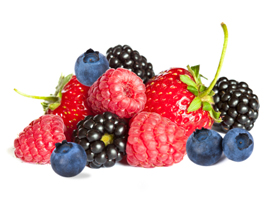Every day, our bodies go through a normal process called “oxidation,” which is simply what happens when oxygen comes in contact with another substance — in this case, the body’s living tissue.
But while this process is necessary and inevitable, it also results in the production of molecules with unpaired electrons. These “free radicals” can cause unhealthy changes in the body.
For instance, free radicals alter the coronary vessels in a way that leads to atherosclerosis (hardening of the arteries), causing them to become narrowed, leading to heart disease and an increased chance of heart attack.
Antioxidants are vitamins and other compounds contained in foods that help prevent this harmful oxidative process. That’s why it’s beneficial to fill your plate every day with antioxidant-rich foods such as blueberries. The United States Department of Agriculture recently rated 100 foods on their antioxidant power, and blueberries received an “A” rating. Blueberries also suppress inflammation, which is a key driver of coronary artery disease.
One of the questions I get asked most often is if blueberries retain their health benefits when they are not eaten fresh. The good news is that it doesn’t matter if blueberries are fresh, frozen, dried, or cooked. In fact, no matter how they are prepared, the nutrients in blueberries remain some of the most healthful things you can eat.
What are other good sources of antioxidants? Other berries, like blackberries, raspberries, and strawberries, also are excellent choices. Beans, including black, red, and pinto, and nuts, such as walnuts, pecans, and almonds, contain antioxidants, as do many fruits and vegetables.

